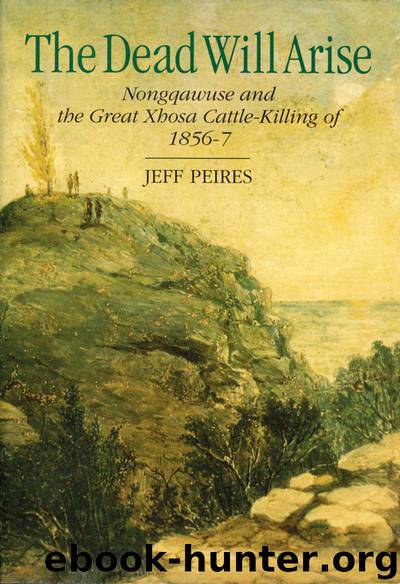Dead will Arise by Peires Jeff

Author:Peires, Jeff
Language: eng
Format: epub
Publisher: Jonathan Ball Publishers
Published: 2013-05-28T04:00:00+00:00
He never quailed in the slightest as all the others did, under my most violent animadversions. He gave me more trouble to render obedient than all the other chiefs. Still he respected me and I him …6
Never the best judge of character, Sir Harry was perhaps influenced by Mhala’s decision to rename his Right-Hand Son ‘Smith’ in the Governor’s honour. He renamed his Great Son ‘Makinana’ after Mackinnon, the first Chief Commissioner of British Kaffraria.
Mhala’s political style extended also to the field of military operations. He was an inveterate enemy of the Colony and the settlers, having grown up west of Grahamstown in the days when the lands of his father Ndlambe stretched almost to Port Elizabeth. He was old enough to remember the catastrophic defeat of the Fourth Frontier War (1811-2) and the death of three brothers in the battle of Grahamstown during the Fifth (1818-9). Mhala’s hostility did not abate when he assumed the Ndlambe chieftainship in 1828, but his relatively flat and open territory did not permit the sort of sustained guerrilla warfare which Maqoma and his brother Ngqika chiefs waged in the forested and inaccessible Amathole mountain ranges. Mhala’s strategy in the Sixth (1834-5) and Seventh (1846-7) Frontier Wars was one of pretended neutrality, remaining technically at peace but sending out raiding parties, supplying the Xhosa fighters in the mountains and sheltering their women, children and cattle. Once and only once did Mhala come out into the open, an exception to his normal behaviour which he was greatly to regret. He was asked to join in an attack on Fort Peddie, which would have necessitated his marching during daylight hours. ‘I am the wildcat,’ Mhala protested, ‘a thing which walks by night.’ Accused of cowardice, he eventually gave way against his better judgement.7 The British cavalry caught the Ndlambe army on the plains of the Gwangqa and 500 Xhosa perished in the biggest Xhosa military disaster for nearly 30 years. Mhala lost two brothers killed virtually before his eyes in the very bush where he, too, was hiding. In the War of Mlanjeni, therefore, he resumed his old method of malevolent neutrality, aiding and abetting the Ngqika Xhosa every way he could short of open warfare. Although his duplicity was recognised by Maclean and Governor Cathcart, they had enough on their hands without a shooting war near the strategic port of East London and so, despite the ranting of the settler press, Mhala ended the war in full possession of his territory and his cattle.
Mhala did not, of course, enjoy living under the colonial government, but up until the initiation of Grey’s new policies, he had managed fairly well. His immediate superior was Maclean, resident at Fort Murray 40 kilometres away. As we have seen, in the days before Grey’s governorship Maclean had been most reluctant to interfere with the prerogatives of chieftainship, believing as he did that Smith’s deposition of Sandile was the main cause of the War of Mlanjeni. William Greenstock, the Anglican missionary
Download
This site does not store any files on its server. We only index and link to content provided by other sites. Please contact the content providers to delete copyright contents if any and email us, we'll remove relevant links or contents immediately.
| Africa | Americas |
| Arctic & Antarctica | Asia |
| Australia & Oceania | Europe |
| Middle East | Russia |
| United States | World |
| Ancient Civilizations | Military |
| Historical Study & Educational Resources |
Goodbye Paradise(3810)
Men at Arms by Terry Pratchett(2837)
Tobruk by Peter Fitzsimons(2517)
Borders by unknow(2313)
Arabs by Eugene Rogan(2299)
Pirate Alley by Terry McKnight(2221)
More Than Words (Sweet Lady Kisses) by Helen West(1867)
Belonging by Unknown(1857)
It's Our Turn to Eat by Michela Wrong(1731)
The Biafra Story by Frederick Forsyth(1656)
The Source by James A. Michener(1613)
Botswana--Culture Smart! by Michael Main(1601)
Coffee: From Bean to Barista by Robert W. Thurston(1544)
A Winter in Arabia by Freya Stark(1538)
Gandhi by Ramachandra Guha(1531)
The Falls by Unknown(1525)
Livingstone by Tim Jeal(1489)
The Shield and The Sword by Ernle Bradford(1409)
Africa: Altered States, Ordinary Miracles by Richard Dowden(1384)
